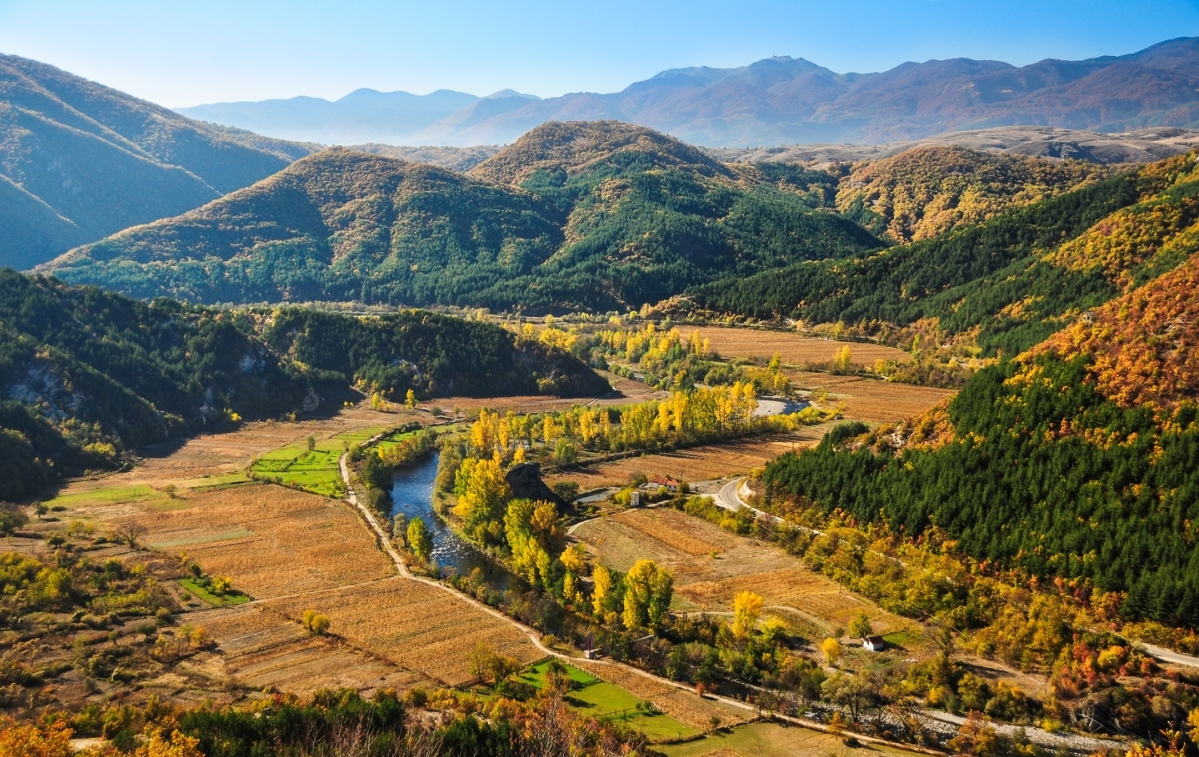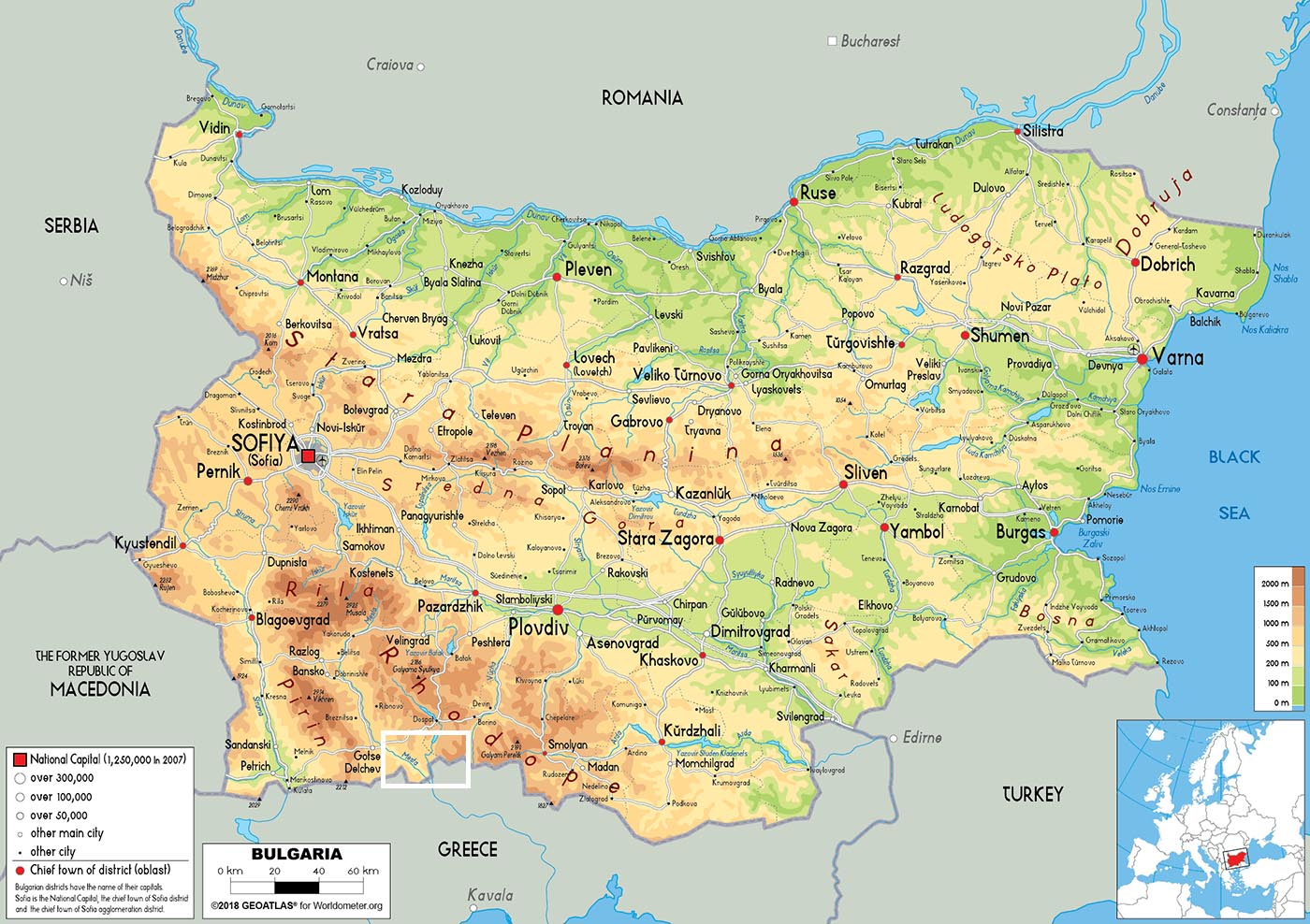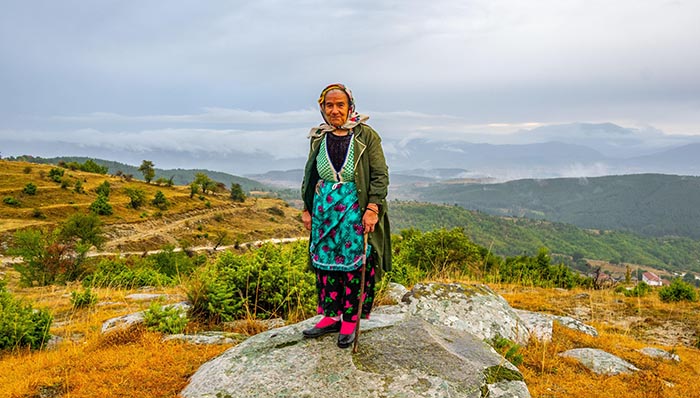News & Views
Elixir: In the Valley at the End of Time by Kapka Kassabova
Charlotte Maberly reviews a book about the search for wholeness, and a heartfelt plea to reclaim our spiritual, physical and emotional unity with nature

The Mesta Valley in Bulgaria. Photograph: Maya Eye [/]
The search for an elixir, or miracle cure, has caught imaginations across time. Even in our demystified age, we continue to be seduced by the idea that lifestyle hacks, superfoods, cosmetic procedures, diet plans, and miracle cures – both natural and synthetic – will somehow deliver swift solutions to potentially complex problems.
Kapka Kassabova’s latest book, Elixir: In the Valley at the End of Time,[1] documents her search for something that ‘people look for and can’t find…’ [p. 367]. She travels to the Mesta Valley, a wild region of Bulgaria rich in biodiversity and herbal knowledge – a place where Europe’s only wild rivers run and bears still live in the forest. There, as a self-proclaimed hypochondriac, she pursues her curiosity about the healing power of plants. She hears tell of a tantalising ‘immortal flower’ but ‘[No-one could] explain what its properties were. Or wouldn’t.’ The elusive and mysterious plant never manifests, and its spectral presence throughout the book is a comment on the fallacy of looking for answers in the material.
But Elixir is about more than just a search for a magic cure. It is above all a portrait of a vanishing way of life and a relationship to nature that most of us do not even know we have forgotten. The book is the third in a series in which Kassabova has written about the regions of her ancestors. In 2017 she wrote Border [2] which explores the complex metaphorical and political significance of the liminal spaces where Greece, Turkey and Bulgaria touch. She followed this in 2020 with To The Lake [3] which follows her maternal lineage via personal and historical stories drawn from the shores of Lake Ohrid in Northern Macedonia and Lake Prespa in Albania. For Elixir, she travels to her country of birth to begin a ‘pilgrimage into nature’. After witnessing the traumatic clear-felling of forests around her home in Scotland, she is seeking an environment in which nature – and human connection with it – feels whole.

Location of the Mesta Valley in South-West Bulgaria (white box)
A Vanishing Culture
.
Arriving in the Mesta landscape, Kassabova relates a feeling of having journeyed back through time to an ancient land of dangerous forests, wild rivers and unconquerable mountains. She is astounded by the sheer volume of wild plants continually collected from the forests, but locals claim things were even more abundant before encroaching industry began to impact the vitality of the ecosystem. Exploring villages that have been almost entirely abandoned, she finds a comparison between this and centuries of clearances across Scotland – a ‘reduction’ of the environment, and an ‘emptying’ of communities, as people were killed or forced to leave their homes. The book is, in part, an attempt to redress an historical oversight, shining light upon the Pomak people of the region, who continue to be marginalised after more than a century of persecution. Kassabova sets out to capture the stories and knowledge of a population and way of life on the brink of disappearing.
The area still has a robust trade in wild plants maintained by a dwindling force of aging locals who are paid less and less by the international traders purchasing their haul. These are the people whom Kassabova seeks out, documenting prolific stories, botanical details, cultural observations and character portraits. There is a sense of urgency in her meticulous descriptions as she tries to capture as much of this wisdom and vanishing world as she can, not only by noting the plant lore and medicinal knowledge, which is overwhelmingly extensive, but also the personal histories which evidence the tumultuous and violent past of the region. ‘Without memory’, she observes, ‘there is no story to tell. Without story, there is no memory.’ [p. 126]
She expresses a deep sense of injustice that the identity of the wild plant collectors is obscured from those who ultimately consume their products, and that their specialist and extensive knowledge is not recognised. For instance, she tells us that they are referred to as ‘Unskilled workers: that’s how the British press describes the people who plant, harvest, process, package and bring food to our doorsteps’ [p. 78]. Consumers of anonymous food are also denied the nourishment of being connected to the earth-experts who feed them. It is one of many shattered connections for which Kassabova feels an elixir is needed.
When she returns home, she is keen to apply her growing knowledge of wild plants in the landscape around where she lives and reflects on the differing attitudes to wild plants between the two countries.
In Britain, wild plants are still associated with ‘witches’ because in the phytophobic collective mind, plant use is conflated with the horrific fate of witches at the hands of the church. I go for river walks with a Scottish friend and the first time she saw me collecting St John’s Wort she said, only half joking: ‘In the past you would’ve been burned for this.’ And we half-laughed. Because we only half-know how damaged we are. [p. 67]

Elderly Pomak woman in Kribul, Bulgaria. Photograph: Pavel Dudek / Alamy Stock Photo
Healing and Wholeness
.
The ‘elixir’ of the title not only refers to the cures held within the collective knowledge of the Mesta Valley, but also what use of that knowledge signifies. Many of the people she meets list plant applications which contradict one another. It seems that the commitment to objective accuracy is often superseded by the strength of relationship with the plant. Foragers in the Mesta Valley refer to plants and fungi in the singular, ‘Today I will collect “blueberry”, “mushroom”, “leaf”’, as though they are referring to an essential form deserving of respect.
Kassabova reveals to us that the practices and rituals associated with the gathering and application of herbs are just as important as the plants themselves. When a herb is to be used for a spell or cure, permission must be asked of the plant before picking. If it is heard to refuse, then the medicine will be unsuccessful. She visits local witches, and even a ‘seer’ who communes with ethereal beings to diagnose – with astonishing accuracy – her physical ailments before prescribing herbs she must remain in relationship with for the rest of her life. On another occasion, she experiences damage and evil being exorcised from her body in a ritual involving an egg. The reader can join Kassabova in her occasional scepticism of these elaborate practices, but we can hopefully also perceive what she comes to realise: that many of the practices and rituals signify, and support, a willingness to engage with something beyond the individual self – to grasp a reality in which we are not separate from nature.
In this way, Kassabova observes a co-creation of wildness between people and nature. To live in the Mesta Valley, the community has chosen to cultivate a reciprocal relationship with the awesome force of nature around them rather than fearing or fetishising it, not least because they rely upon it for their livelihood. She notes how this differs from a common attitude in contemporary environmentalism, which tends to portray ‘re-wilding’ as an ecological restoration requiring the removal of people. In fact, the depopulation of the Mesta Valley appears to be reducing both the vitality of the landscape and the people at the same time. As the lives of the community become increasingly modernised and disentangled from the forests and mountains, Kassabova fears the value of that ancient reciprocal relationship will be forgotten, and the sense of inner wildness will be seen as increasingly abhorrent.
She explores this through an unsettling portrait of Emin, a man who breeds wild horses and chooses to live in the remotest parts of the mountains and forests all year round. Kassabova spends days trekking with him, portraying him as being unhinged from convention, pushed to an extreme existence by society’s rejection of his way of life.
People like Emin don’t exist anymore because wilderness almost doesn’t exist anymore. But we used to be everywhere. The wreath of seventy-seven and a half herbs was woven from the Beauly River to the Mesta to the Nile and beyond. Until the herbs became weeds, the women became witches and the child of nature became a madman.” [p. 36]
.
.
Elixir
.
For her, then, elixir is neither an item to find nor a destination to reach, but a journey of understanding and healing. ‘In Old English, heal means whole; to heal is to make whole again,’ and Kassabova’s journey shows her that ‘wholeness’ is not solely a physiological state, but a reconciliation with one another and our environment.
Humanity’s longing for elixir has never gone away. But we have forgotten its true meaning because somewhere along the way we gave up the search for it. We settled for a long narrow life instead of a short one with depth. We forgot how to heal. We gave our power away and debased elixir to an anti-aging cream. We settled for less than the whole. Your task is to remember how to make it whole again. [p. 85]
that if we believe health to be as simple as taking the correct plants, drugs, or finding the right fitness plan, then we are missing the point. It is the practice and depth of relationship we need to seek. Kassabova’s call to her reader to ‘remember how to make ourselves whole’ is not prescriptive, but is a heartfelt plea to reclaim our spiritual, physical and emotional unity with nature. Ultimately, she shows us, an elixir is ‘not a liquid or an object… it is a search for completeness.’ [p. 84]
Elixir was published by Jonathan Cope in February 2023. The paperback is expected in February 2024.
Sources (click to open)
[1] KAPKA KASSABOVA, Elixir: In the Valley at the End of Time (Jonathan Caper, 2023).
[2] KAPKA KASSABOVA, Border: A Journey to the Edge of Europe (Paperback, Granta, 2017).
[3] KAPKA KASSABOVA, To the Lake: A Journey of War and Peace (Granta, 2020).
Charlotte Maberly is a freelance writer interested in the interconnections between people, place and nature. Read more at FoodConnects.net
More News & Views
Poems for These Times: 18 – New Year 2024
Benjamin Zepahniah | Faceless
“You have to look beyond the face
to see the person true
Down within my inner space
I am the same as you…”
Introducing… ‘Tiger Work’ by Ben Okri
Barbara Vellacott reads from and discusses a new book of stories, parables and poems about climate change
Book Review: “Work: A Deep History” by James Suzman
Richard Gault reviews a new book which takes a radical approach to contemporary work culture
Introducing… Bernardo Kastrup and Swami Sarvapriyananda
Charlotte Maberly appreciates a wide-ranging video conversation about Eastern and Western concepts of the self and mind
Connecting Threads on the River Tweed
Charlotte Maberly investigates an innovative project which explores cultural engagement as the driver of ecological change
The Treeline: The Last Forest and the Future of Life on Earth
Jane Clark | reviews a book about the effects of climate change on the great boreal forest at the top of the world
FOLLOW AND LIKE US
——————————————
——————————————
——————————————
If you enjoyed reading this article
Please leave a comment below.
Please also consider making a donation to support the work of Beshara Magazine. The magazine relies entirely on voluntary support. Donations received through this website go towards editorial expenses, eg. image rights, travel expenses, and website maintenance and development costs.
READERS’ COMMENTS
3 Comments
Submit a Comment
FOLLOW AND LIKE US
Beautifully written and evokes something of the elusive depth of what is at the heart of something priceless, something being lost, and made alive again – one trusts – in Kassabova’s book, Elixir. One can only be grateful for this.
Good review, thank you. the second quote was particularly cathartic
Some very thoughtful insights well worth deeper consideration